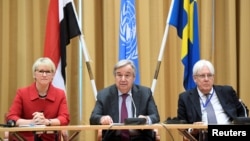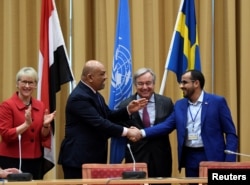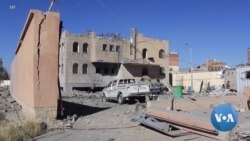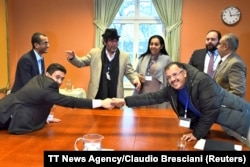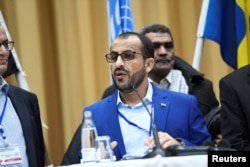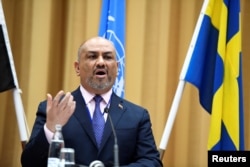Talks between Yemen's two opposing sides outside the Swedish capital, Stockholm, ended Thursday with a key agreement to hand control of the key Red Sea port of Hodeida to the United Nations. But delegates failed to agree on reopening Sana'a Airport or resolving economic disputes. They will tentatively attend a fresh round of talks late next month.
The audience clapped in approval as the lead negotiators for both the internationally-recognized government of President Abdrabbu Mansour Hadi and the Houthi delegation unexpectedly shook hands, under the watchful eye of U.N. Secretary-General Antonio Guterres.
The U.N. chief lauded the agreement.
"You have reached an agreement on Hodeida port and city, which will see a mutual redeployment of forces from the port and the city and the establishment of a governorate-wide cease-fire," he said.
WATCH: UN Pushes for Peace in Yemen
The U.N. is expected to administer the port and unblock humanitarian aid to the capital, Sana'a, and other parts of the country suffering from a humanitarian crisis. Each side also agreed to allow the U.N. to remove mines and explosives in the region.
Guterres said both parties will continue peace talks in January and attempt to reach agreement on outstanding issues, including reopening the airport and resolving economic disagreements.
"[Both sides] have agreed to engage in the discussions on a negotiating framework at the next meeting [in January]," he said. "This is a critical element for the future political settlement to end the conflict."
Guterres stressed that there is "no military solution to the conflict" and that negotiations are a "complex and lengthy process."
He thanked his special envoy, Martin Griffiths, for the "many shuttle trips" he made between capitals and delegations to reach an agreement.
Swedish Foreign Minister Margot Wallstrom, whose country hosted the lengthy talks, expressed gratitude for the goodwill shown by both sides.
"We came here a week ago with low expectations, but high ambitions," she said. "And we are happy that consultations have been taking place in a good spirit and in good faith and a good, concrete result in the end."
The top Houthi negotiator, Mohammed Abdul Salam, told journalists at a press conference that his delegation tried to be flexible and made many concessions.
He says that the Houthis agreed to mutual redeployment in Hodeida with the U.N. playing a role in overseeing the port and inspecting ships.
He maintained that the Houthis made concessions over Hodeida for the sake of the Yemeni people. But he said the Hadi government did not agree to discussions for a political settlement and expressed anger over the lack of an accord to reopen Sana'a Airport.
The Houthis say international flights should be searched by outside parties in either Egypt or Jordan. The Hadi government demands they be inspected at Aden Airport, which it controls.
Foreign Minister Khaled al Yamani, who headed the government delegation, said the Houthis failed to carry out "71 previous agreements." He argued the present agreement to hand Hodeida over to the U.N. was made "with the hypothetical understanding that [the Houthis] would carry it out."
Yamani also laid blamed the Houthis for the failure of economic talks, claiming they insisted that back salaries be paid to government employees that they hired, other than those on the payroll before the conflict began in 2014.
Houthi negotiator Abdul Salam, however, called this "political posturing." He also criticized the Hadi government's demand that planes be inspected at Aden Airport "because some Yemenis from Sana'a" were "arrested [there] in the past."
But Abdul Salam praised the agreement on the port, calling it a "good thing ... which reinforces the chances of peace in Yemen."
He added that "everyone hopes to end the war and lift the blockade of the country."
WATCH: UN Pushes for Peace in Yemen




